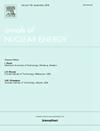A control-oriented hybrid modeling method for small pressurized water reactors based on linear models and neural networks
IF 1.9
3区 工程技术
Q1 NUCLEAR SCIENCE & TECHNOLOGY
引用次数: 0
Abstract
Linear models such as state-space and transfer function models are widely used in the control design of nuclear reactors. However, due to the simplifications in model linearization, parameter and structural errors inevitably exist in linear reactor models. This paper proposes a neural network-based hybrid modeling method for small pressurized water reactors (SPWRs) to calibrate their inaccurate linear models. First, key parameters that have significant impacts on the SPWR linear models are obtained through sensitivity analysis. Then, the gradient descent algorithm is applied for the neural networks training with the loss functions constructed with the two most important control objectives of the SPWR. Finally, the neural networks are used to calibrate the selected key parameters in the SPWR linear models to construct accurate control-oriented hybrid models. Simulation results of the SPWR show that the neural network-based hybrid modeling method can significantly decrease the transient and steady-state errors of the linear models.
基于线性模型和神经网络的小型压水堆面向控制的混合建模方法
线性模型如状态空间模型和传递函数模型在核反应堆控制设计中得到了广泛的应用。然而,由于模型线性化的简化,线性反应器模型不可避免地存在参数误差和结构误差。本文提出了一种基于神经网络的小型压水堆混合建模方法,以校正其不准确的线性模型。首先,通过灵敏度分析得到对SPWR线性模型有重要影响的关键参数;然后,将梯度下降算法应用于神经网络训练,并以SPWR的两个最重要控制目标构造损失函数。最后,利用神经网络对SPWR线性模型中选定的关键参数进行标定,构建精确的面向控制的混合模型。SPWR的仿真结果表明,基于神经网络的混合建模方法可以显著降低线性模型的暂态和稳态误差。
本文章由计算机程序翻译,如有差异,请以英文原文为准。
求助全文
约1分钟内获得全文
求助全文
来源期刊

Annals of Nuclear Energy
工程技术-核科学技术
CiteScore
4.30
自引率
21.10%
发文量
632
审稿时长
7.3 months
期刊介绍:
Annals of Nuclear Energy provides an international medium for the communication of original research, ideas and developments in all areas of the field of nuclear energy science and technology. Its scope embraces nuclear fuel reserves, fuel cycles and cost, materials, processing, system and component technology (fission only), design and optimization, direct conversion of nuclear energy sources, environmental control, reactor physics, heat transfer and fluid dynamics, structural analysis, fuel management, future developments, nuclear fuel and safety, nuclear aerosol, neutron physics, computer technology (both software and hardware), risk assessment, radioactive waste disposal and reactor thermal hydraulics. Papers submitted to Annals need to demonstrate a clear link to nuclear power generation/nuclear engineering. Papers which deal with pure nuclear physics, pure health physics, imaging, or attenuation and shielding properties of concretes and various geological materials are not within the scope of the journal. Also, papers that deal with policy or economics are not within the scope of the journal.
 求助内容:
求助内容: 应助结果提醒方式:
应助结果提醒方式:


